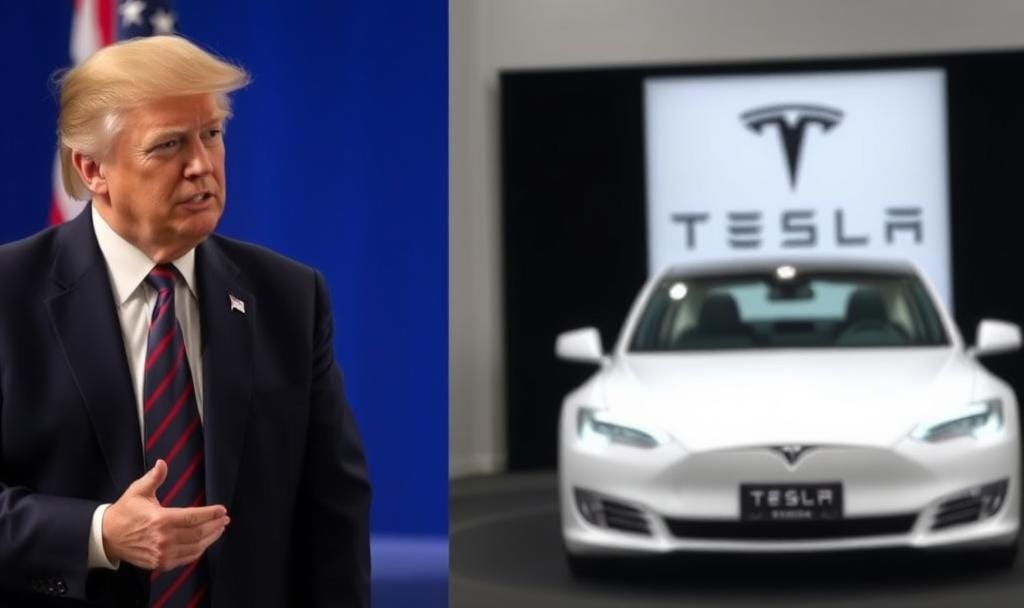Donald Trump Criticizes Tesla's India Expansion Plans as 'Unfair'
In a joint interview with CEO Elon Musk on Fox News, former U.S. President Donald Trump strongly disapproved of Tesla's plans to build a manufacturing facility in India. Trump described the move as "very unfair" to the United States, citing concerns about India's high import tariffs on electric vehicles (EVs) and their impact on American businesses. The remarks come amid Tesla's preparations to enter the Indian market, including hiring staff and selecting showroom locations in New Delhi and Mumbai.
Trump's Concerns Over Tariffs and Trade Fairness
Trump's criticism stems from India's historically high import duties on EVs, which can reach up to 100%, making it challenging for foreign automakers to compete in the Indian market. During the interview, Trump stated, "Every country in the world takes advantage of us, and they do it with tariffs... It is impossible to sell a car, practically, in India." He argued that Tesla establishing a factory in India would allow the company to circumvent these tariffs, which he deemed unfair to American interests.
India recently introduced a revised EV policy aimed at attracting global manufacturers. The policy reduces import taxes to 15% for companies investing at least $500 million in local manufacturing. While this opens the door for Tesla's entry into India, Trump maintained that such an arrangement disadvantages the U.S., stating, "If he [Musk] built the factory in India, that's okay, but that's unfair. It's very unfair."
Tesla's Entry into India: A Long-Awaited Move
Tesla has been eyeing the Indian market for years but faced hurdles due to regulatory challenges and high import taxes. Recent developments suggest that the company is finally moving forward with its plans. According to reports, Tesla has begun shipping vehicles from its German factory and is exploring potential locations for a manufacturing plant in India. The company is also expected to invest between $2 billion and $3 billion in setting up production facilities capable of producing 500,000 vehicles annually.
Indian Prime Minister Narendra Modi's government has been actively courting Tesla as part of its broader push to boost EV adoption and local manufacturing. During his recent visit to the U.S., Modi met with Musk, with whom he discussed issues ranging from technology innovation to space exploration. Following these discussions, Tesla announced plans to open showrooms and hire staff in India.
India's EV Market: Opportunities and Challenges
India is the world's third-largest auto market but remains in the early stages of EV adoption. Local automakers like Tata Motors dominate the market, benefiting from policies designed to protect domestic industries. However, the government's new EV policy aims to change this dynamic by offering incentives for foreign manufacturers willing to invest in local production.
The policy allows companies to import up to 8,000 vehicles annually at reduced duties if they commit significant investments toward manufacturing facilities. This initiative aligns with India's broader goals of reducing import reliance and fostering a robust domestic EV ecosystem.
Trump's Reciprocal Tariff Proposal
Trump has long advocated for a "reciprocal tariff" system, in which the U.S. would impose equivalent duties on imports from countries that heavily tax American goods. During his Fox News interview, Trump reiterated this stance: "Whatever they charge, we’ll charge." Such measures could escalate trade tensions globally but reflect Trump's commitment to protecting American industries.
Looking Ahead: Implications for Tesla and U.S.-India Relations
Tesla's entry into India marks a significant milestone for the company and India's EV sector. However, Trump's criticism highlights potential challenges in balancing global expansion with domestic economic interests. As Tesla moves forward with its plans, it remains to be seen how these developments will impact U.S.-India trade relations.
For now, Indian states are competing fiercely to host Tesla's manufacturing plant, offering various incentives and infrastructure support. Meanwhile, industry observers will closely watch how Trump's comments influence public opinion and policy discussions surrounding global trade and investment.
In summary, while Tesla's India expansion represents a breakthrough for the EV giant and India's automotive industry, it also underscores ongoing debates about trade fairness and economic priorities between nations.



